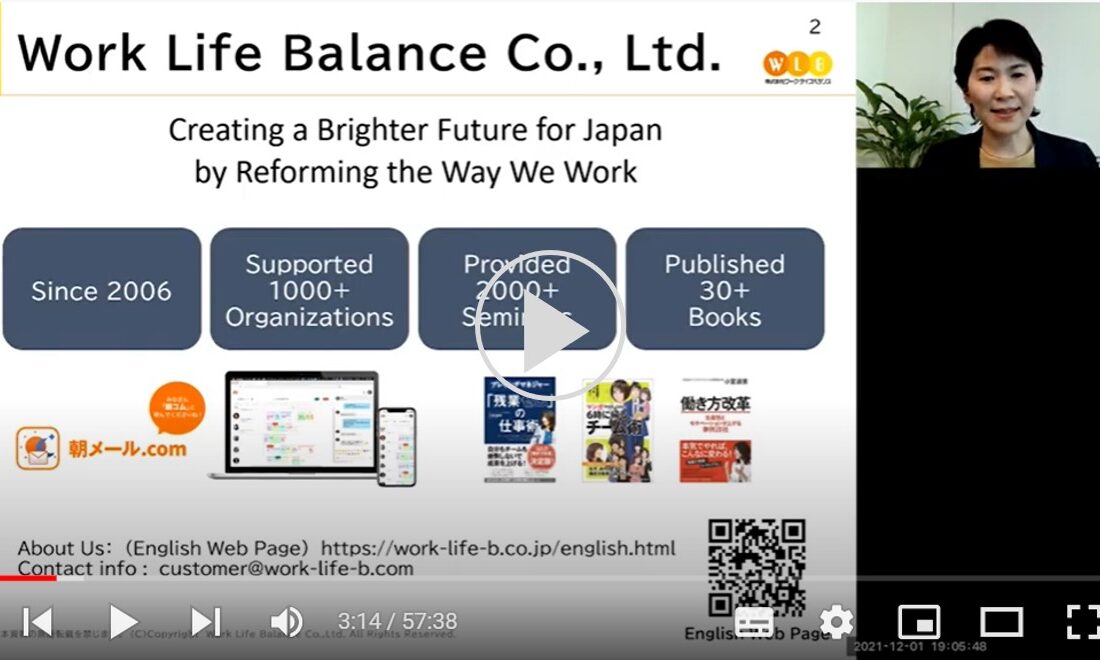【About Us】Work-Life Balance Co., Ltd.
Table of Contents
- A Vision to Change Japan’s Work Culture ▼
- The Future of Work in Japan▼
- Implications for Japan ▼
- How Reducing Work Hours Will Change Corporate Culture and Society, and Lead to Increases in the Birth Rate and Productivity ▼
- Our Methodology▼
- Media clips▼
- Connect with Us!▼
A Vision to Change Japan’s Work Culture
At Work-Life Balance Co., Ltd.(WLB), we have the audacious goal of changing the way people work in Japan. We believe the key to solving the declining birthrate, increasing labor productivity and rejuvenating Japan’s economy is changing the workplace culture. This is no easy task; Japan has some of the highest rates of overtime as work has been put above all else throughout society. That’s why this goal is not limited to simply changing the workplace. Ultimately, we strive to create a happier society in which everyone’s choices are valued – and importantly, a place where each individual can afford to make those choices.
Currently many people feel they are sacrificing their lives for work, with no time to rest or develop interests beyond their defined professional role. Their personal development is further inhibited by a work culture that stifles creativity and innovation. In order for Japan to boost its low productivity and compete on a global stage, the situation must be changed. People need to have flexibility and control over their own lives. In the workplace, such empowered employees add real value and bring about innovation.
Employees who have to raise a family, support a partner or take care of an elderly parent should have the choice to continue working a more flexible work schedule and not have to give up their careers. In the current system, however, many employees feel like they are no longer needed or valued in the company, simply because they can’t put in the long hours that are expected of them. Unfortunately, it’s not feasible to make time to take care of a family member or child when you work more than 10 hours a day, five or more days a week, consecutively.
In the traditional, hierarchical workplace, employees had little say about when and how much they worked. Yet stacks of workplace studies have concluded that the empowered, flexible workplace is a more productive workplace. Once this mentality shifts from hours worked to productivity being the core metric, the Japanese work style will change for the better. In turn, this will positively impact society and thus the choices in life for employees will also change, opening up the possibility to raise children or take care of an elderly parent without having to abandon your career.
But how do we get people to adopt a new lifestyle and boost productivity when the current culture is so ingrained? How do we convince executives to change decades of corporate tradition and adopt new strategies? What role should the government play? Fortunately, a complex problem does not necessarily need a complex solution – in fact, a simple one will often suffice, assuming we have a grasp of the root issues.
The Future of Work in Japan
The two most important issues facing Japanese businesses are the declining population and low labor productivity. In order to continue to grow and thrive as a nation, these core issues (elaborated on in the below snapshot) need to be simultaneously addressed.
Declining population and shifting age distribution
The super-aging of Japan continues, and by the year 2035, a third of the population will be over 65 years old.
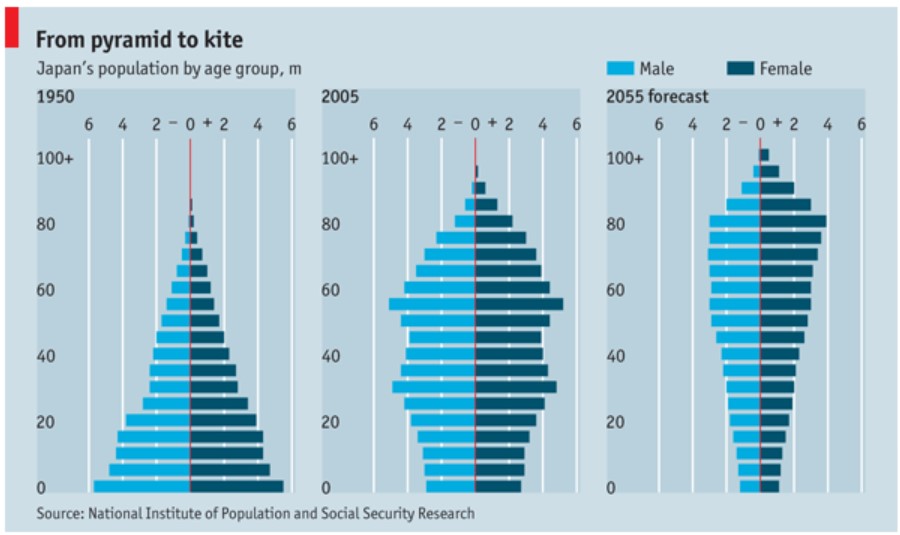
“Japan has recently become the first country in history with an average age of over 40. Japan is projected to have nearly 750,000 centenarians (nearly 0.75 percent of the population) by 2050. […] Rapid population aging and declines in the working-age population have significant implications for the rate of national economic growth and the ability to finance the country’s social security system.” – David Bloom
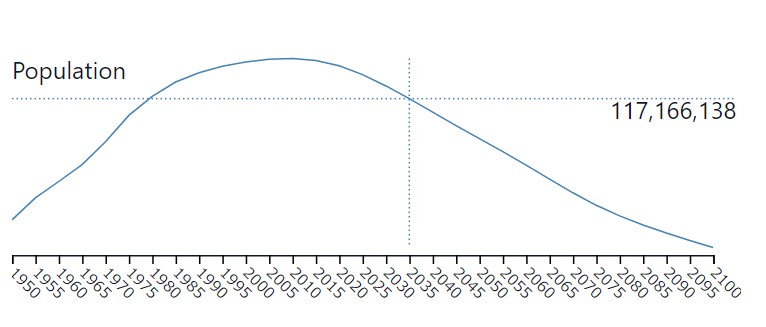
Japan’s birth rate is falling. It is not that everyone should be having more children, of course, and each individual’s life choice should be respected. However, the number of children that couples want in Japan is greater than the number of actual births (see study). They cite the main reason as the cost of raising a child, followed by their increasing age and physical challenges. For those who do want to have children, we want to create a society where they have that choice.
Low labor productivity per hour
Japan’s labor productivity level is around two-thirds of that of the U.S. and the lowest among the G7 countries. Raising labor productivity is essential for Japan’s economy as the available labor force decreases.
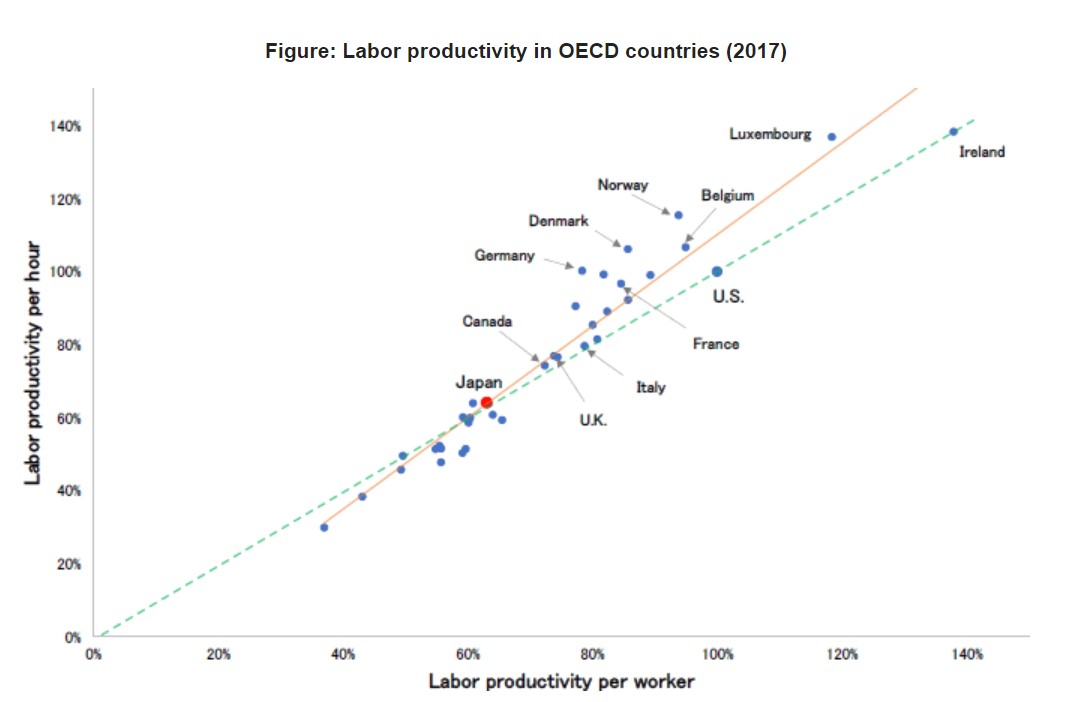
Proportion of Full-time Workers Working 60 hours or More per Week
For men in their 30s and 40s-ages at which child-rearing is mostly conducted–the proportion of employed men who work 60 hours or more per week is approximately 14 %, which is a high level.
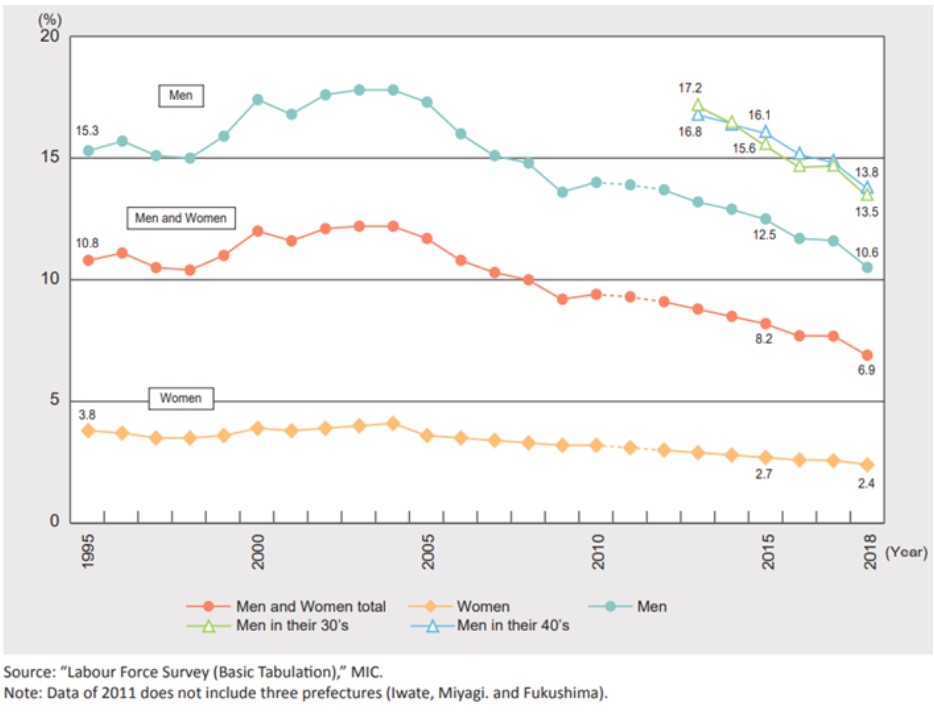
Source: Gender Equality Bureau Cabinet Office
Implications for Japan
What does the above mean for Japan? First, in regards to population change, countries pass through various stages of demographic shifts. Dr. David Bloom surmises that the period of Japan’s economic growth – called the “Demographic Dividend” – has now ended. The result is a decline in the number of people in the workforce, contributing to a worsening labor shortage. This shortfall negatively impacts the economy because there will not be enough working-age employees to fill the number of available job vacancies.
Second, several factors lower labor productivity, from how employees are treated to the systems in place at organizations. Another troublesome issue is a lack of both quality and quantity of sleep, which many employees are not getting. We now have ample evidence that a lack of sleep reduces our ability to control our emotions, suppresses our immune system, makes us less creative, and even reduces fertility. Unhappy and tired employees are less motivated to work, have fewer breakthrough ideas, and have less energy to create a productive life outside of work.
Lastly, working hours play a large role in how society functions. The more hours you work, the less time you have for social activities, dating, and hobbies. This in turn leads to a lower likelihood that you will get married and have children. This study shows how reducing Japan’s working hours can directly impact the declining birth rate. The unfortunate outcome is that many men give up spending time with their family as they believe they need to work long hours to be successful.
How Reducing Work Hours Will Change Corporate Culture and Society, and Lead to Increases in the Birth Rate and Productivity
How Reducing Work Hours Will Change Corporate Culture and Society, and Lead to Increases in the Birth Rate and Productivity
Let’s demonstrate how a shift in working culture could increase both productivity and the birth rate.
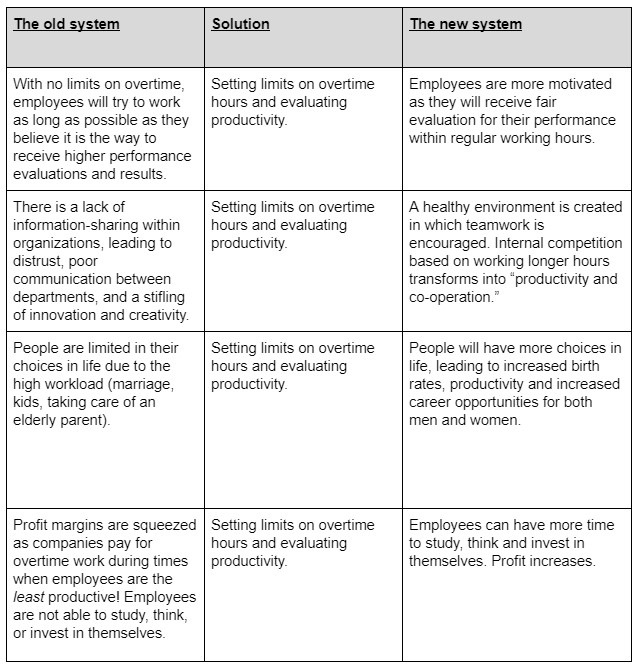
We believe that by making a simple change – reducing working hours – Japan can make drastic changes that will trickle down to the rest of the economy and society. As the number of people in the working age population continues to decline, we need to change our culture and society. In doing so, workers can be more productive, and people can work regardless of their sex. The choices for both men and women will open up, which will lead to more fruitful lives and a happier society.
In Japan, as in most places, meaningful change is based on precedents. Once enough companies improve their workplace cultures, they can serve as role models to attract more corporations to join. In the next section we summarize our methodology and the techniques we have found are producing the results we need to move us towards these goals.
Our Methodology
What we are doing to create a better work environment in Japan
At WLB, we have helped over 1,000 organizations reduce their work hours, increase productivity, and increase employee engagement and happiness. Our organizational change management services and products are helping to create a more competitive Japanese workforce. They include direct consulting, whereby we guide companies in creating effective change in their work culture and systems.
We strive to serve as a positive example for creating a healthy work-life balance culture. We have implemented these best practices in our own organization, where we do not work overtime and all of our employees take 100% of their paid vacation leave. We allow employees to work from home and outside of our office (which is still not very common in Japan).
A summary of our various initiatives:
Ⅰ.We have trained over 1000 “WLB consultants” in our consulting methodology with the aim of engaging and changing the Japanese work culture. Among them, 365 are certified as WLB consultants, and 68 of them are Certified Senior WLB Consultants, and all have experience working with companies throughout Japan.
Ⅱ.We provide over 200 seminars every year throughout Japan, sharing our methodology and educating companies, municipal organizations, schools, hospitals, police, and many other organizations.
Ⅲ.We’ve developed various tools to help people change how they work. View our tools here (available in Japanese only).
Ⅳ.We are working together with the government to advocate for labor policy change. By showing politicians real use-cases where we’ve helped companies increase their productivity through reducing overtime, we have been able to successfully encourage policy change. In turn, new policies can favorably influence corporate culture and steadily impact society. Much progress has been made. Notably, the government has recently passed a law that sets an upper limit on the amount of overtime.
At the core of our business is our consulting services for companies all across Japan. We start with small teams within the organization and pilot key initiatives. The measurable outcome is productivity, and each team decides on their various goals to focus on. The below three initiatives are at the core of the consulting services we provide, which ensures each team in the organization is functioning with the skills necessary to implement effective change.
1. Morning Mail & Evening Mail. In many companies, meetings can drag on for hours and too much time is spent on reporting. Time management is particularly challenging for less experienced employees. The purpose of this initiative is to improve time management skills and encourage greater teamwork. These tools allow you to plan your schedule, check whether you are using your time as you intended, and strengthens information-sharing and accountability within the team.
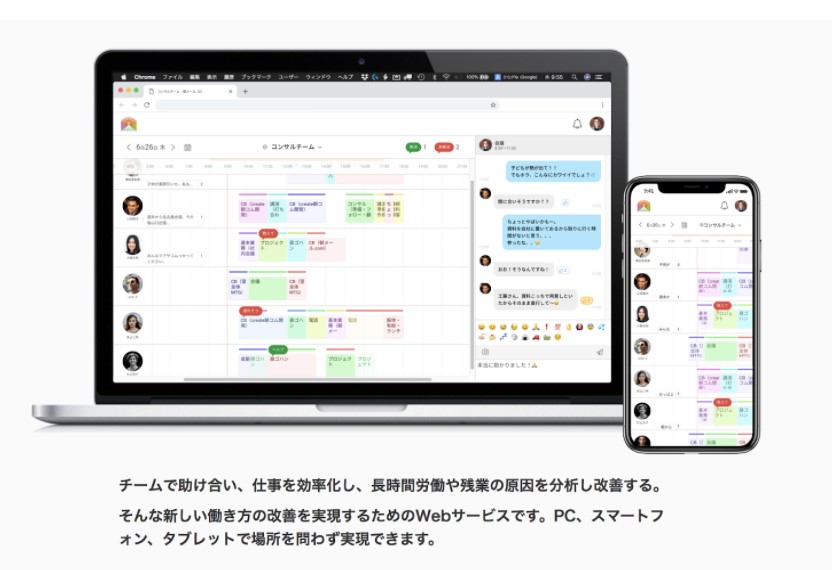
2. “Kaeru” Meeting / Change Meeting. Communication is more positive and constructive when you create a safe place to discuss what needs to be done. Facilitated by our consultants, the team discusses the best approach to achieve their goals. For example, how to produce the same output with less time, or produce greater output within the same amount of time. Solutions include everything from improving clarity on priorities to creating detailed skill maps. After several meetings with our consultant’s help, teams develop the skills to effectively implement these ideas on their own. Below is an example of an idea map employees created in order to achieve their goals. The most effective/easiest ideas being on the top right, where they typically start.
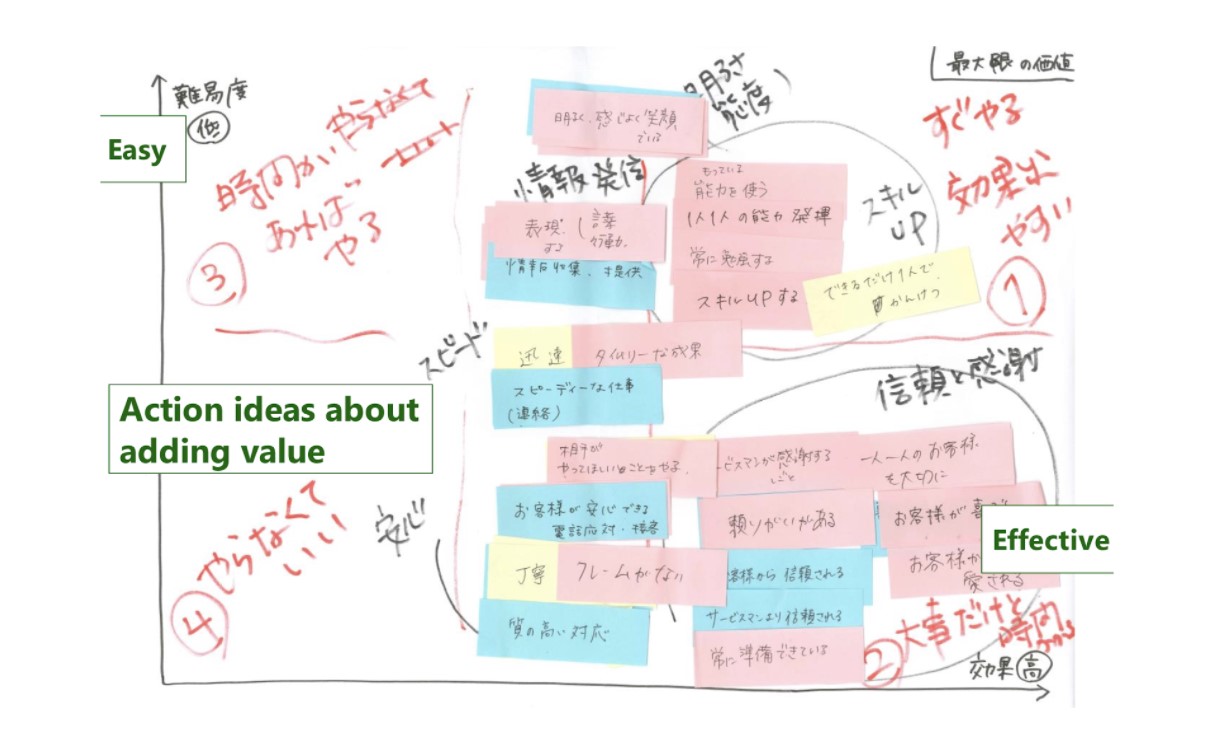
3. Management Skills Based on Psychological Safety.Consultants give feedback and work with managers to help them communicate with the team and improve performance based on the theories of psychological safety. Google’s Project Aristotle — a research project on what makes a great team – found that what really mattered was less about who is on the team, and more about how the team worked together.
We apply two main psychological theories based on their approach — the idea of a psychological safety zone and the core theory of success – the latter developed by MIT professor Daniel Kim. Psychological safety is a shared belief that the team is a safe place for interpersonal risk taking. In psychologically safe teams, team members feel accepted and respected.
The way many companies and teams operate is by focusing on results. Conversely, the Core Theory of Success states that you should focus on the relationships, not the results, and the results will come. When you improve the quality of a relationship, the quality of thinking will improve. People will be less defensive and more open to hearing divergent opinions.
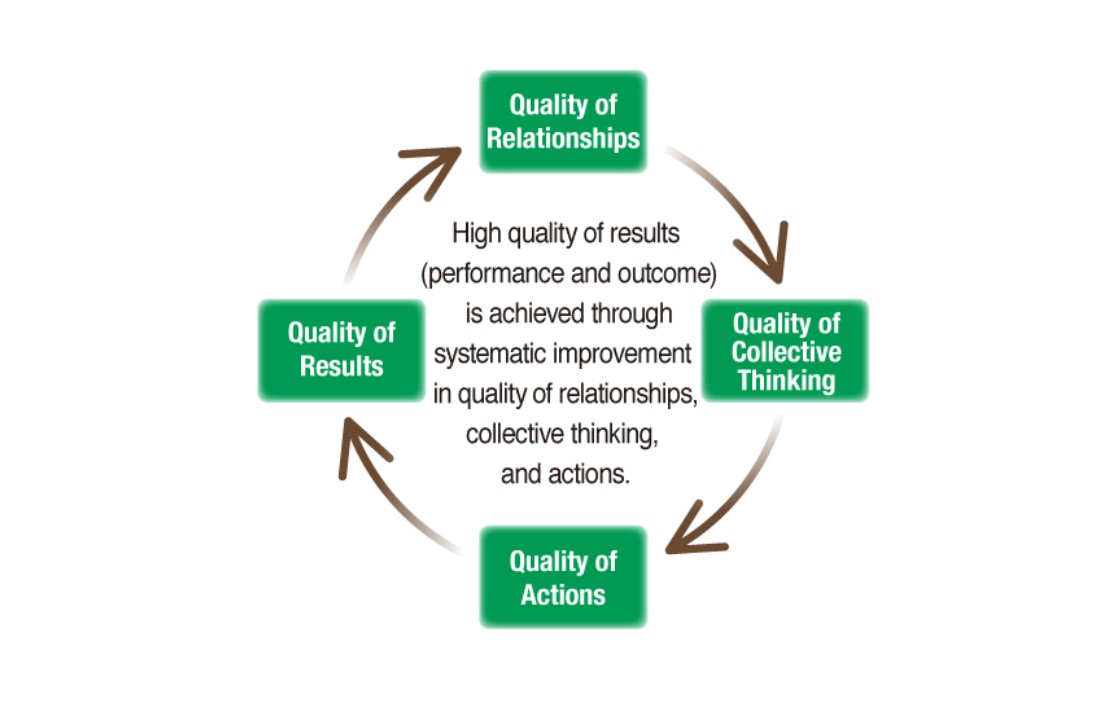
Media clips
Videos
・Yoshie Komuro: “Work Life Balance” at TEDxTokyo
Connect with Us!
Media, Researcher – Are you interested in interviewing WLB? We’re always keen to report on best practices, share what’s happening in Japan, and provide updates on the progress that our clients are making. Please feel free to reach out at media@work-life-b.com.
Investors – We are strong supporters of ESG (Environmental, Social and Governance) investment. Like a strong wind that blows all the ships in one direction, investment in ESG-focused companies will create a greater incentive for Japanese companies to make changes to their workplace culture.


